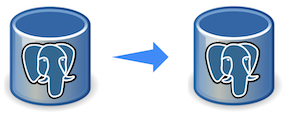This tool facilitates the efficient transfer of data from Oracle to PostgreSQL or from PostgreSQL to PostgreSQL.
The quickest method for extracting data from Oracle is by using ROWID (employing dbms_parallel_execute to segment the data into chunks).
In case of PostgreSQL, we should split a table into chunks by CTID.
As you know, the fastest way to input data into PostgreSQL is through the COPY command in binary format.
The objective is to migrate tables TABLE1, Table2, PARTED from Oracle schema TEST to a PostgreSQL database.
Supported types:
| ORACLE | Postgresql (possible types) |
|---|---|
| char, varchar, varchar2 | char, bpchar, varchar, text, uuid |
| varchar2 | jsonb |
| CLOB | varchar, text, jsonb |
| BLOB | bytea |
| RAW | bytea |
| date | date, timestamp, timestamptz |
| timestamp | timestamp, timestamptz |
| timestamp with time zone | timestamptz |
| number | numeric, smallint, bigint, integer, double precision |
All activities are reproducible in docker containers
git clone https://github.com/dimarudik/bublik.git
cd bublik/
-
arm64:
docker run --name oracle \ -p 1521:1521 -p 5500:5500 \ -e ORACLE_PWD=oracle_4U \ -v ./dockerfiles/scripts:/docker-entrypoint-initdb.d \ -d dimarudik/oracle_arm64:19.3.0-ee -
x86_64:
docker run --name oracle \ -p 1521:1521 -p 5500:5500 \ -e ORACLE_PWD=oracle_4U \ -v ./dockerfiles/scripts:/docker-entrypoint-initdb.d \ -d dimarudik/oracle_x86_64:19.3.0-ee
WARNING: Tables
TABLE1,Table2,PARTEDwill be created and fulfilled during oracle docker container startup
How to connect to Oracle:
sqlplus 'test/test@(description=(address=(host=localhost)(protocol=tcp)(port=1521))(connect_data=(service_name=ORCLPDB1)))'
docker run --name postgres \
-e POSTGRES_USER=postgres \
-e POSTGRES_PASSWORD=postgres \
-e POSTGRES_DB=postgres \
-p 5432:5432 \
-v ./sql/init.sql:/docker-entrypoint-initdb.d/init.sql \
-v ./sql/.psqlrc:/var/lib/postgresql/.psqlrc \
-v ./sql/bublik.png:/var/lib/postgresql/bublik.png \
-d postgres \
-c shared_preload_libraries="pg_stat_statements,auto_explain" \
-c max_connections=200 \
-c logging_collector=on \
-c log_directory=pg_log \
-c log_filename=%u_%a.log \
-c log_min_duration_statement=3 \
-c log_statement=all \
-c auto_explain.log_min_duration=0 \
-c auto_explain.log_analyze=true
WARNING: Tables
public.table1,public.table2,public.partedwill be created during postgre docker container startup
How to connect to PostgreSQL:
psql postgresql:https://test:test@localhost/postgres
threadCount: 10 fromProperties: url: jdbc:oracle:thin:@(description=(address=(host=localhost)(protocol=tcp)(port=1521))(connect_data=(service_name=ORCLPDB1))) user: test password: test toProperties: url: jdbc:postgresql:https://localhost:5432/postgres user: test password: test
[
{
"fromSchemaName" : "TEST",
"fromTableName" : "TABLE1",
"toSchemaName" : "PUBLIC",
"toTableName" : "TABLE1",
"fetchHintClause" : "/*+ no_index(TABLE1) */",
"fetchWhereClause" : "1 = 1",
"fromTaskName" : "TABLE1_TASK",
"fromTaskWhereClause" : " 1 = 1 ",
"tryCharIfAny" : ["current_mood"],
"columnToColumn" : {
"id" : "id",
"\"LEVEL\"" : "level",
"create_at" : "create_at",
"update_at" : "update_at",
"gender" : "gender",
"byteablob" : "byteablob",
"textclob" : "textclob",
"\"CaseSensitive\"" : "\"CaseSensitive\"",
"rawbytea" : "rawbytea",
"doc" : "doc",
"uuid" : "uuid",
"clobjsonb" : "clobjsonb",
"current_mood" : "current_mood"
},
"expressionToColumn" : {
"(select name from test.countries where countries.id = table1.country_id) as country_name" : "country_name"
}
},
{
"fromSchemaName" : "TEST",
"fromTableName" : "\"Table2\"",
"toSchemaName" : "PUBLIC",
"toTableName" : "TABLE2",
"fetchHintClause" : "/*+ no_index(TABLE2) */",
"fetchWhereClause" : "1 = 1",
"fromTaskName" : "TABLE2_TASK",
"columnToColumn" : {
"id" : "id",
"\"LEVEL\"" : "level",
"create_at" : "create_at",
"update_at" : "update_at",
"gender" : "gender",
"byteablob" : "byteablob",
"textclob" : "textclob"
}
},
{
"fromSchemaName" : "TEST",
"fromTableName" : "PARTED",
"toSchemaName" : "PUBLIC",
"toTableName" : "PARTED",
"fetchHintClause" : "/*+ no_index(PARTED) */",
"fetchWhereClause" : "create_at >= to_date('2022-01-01','YYYY-MM-DD') and create_at <= to_date('2023-12-31','YYYY-MM-DD')",
"fromTaskName" : "PARTED_TASK",
"fromTaskWhereClause" : "DBMS_ROWID.ROWID_OBJECT(START_ROWID) IN (73021,73022) OR DBMS_ROWID.ROWID_OBJECT(END_ROWID) IN (73021,73022)",
"columnToColumn" : {
"id" : "id",
"create_at" : "create_at",
"name" : "name"
}
}
]Important
The case-sensitive or reserved words must be quoted with double quotation and backslashes
Note
expressionToColumn might be used for declaration of subquery for enrichment of data
Note
To speed up the chunk processing of partitioned table you can apply fromTaskWhereClause clause as it used above. It allows to exclude excessive workload
Note
If the target column type doesn't support by tool you can try to use Character
by using declaration of column's name in tryCharIfAny array
Halt any changes to the movable tables in the source database (Oracle)
Prepare data chunks in Oracle using the same user credentials specified in bublik tool (fromProperties in ./sql/ora2pg.yaml):
exec dbms_parallel_execute.drop_task(task_name => 'TABLE1_TASK');
exec dbms_parallel_execute.create_task (task_name => 'TABLE1_TASK');
begin
dbms_parallel_execute.create_chunks_by_rowid ( task_name => 'TABLE1_TASK',
table_owner => 'TEST',
table_name => 'TABLE1',
by_row => TRUE,
chunk_size => 100000 );
end;
/
exec dbms_parallel_execute.drop_task(task_name => 'TABLE2_TASK');
exec dbms_parallel_execute.create_task (task_name => 'TABLE2_TASK');
begin
dbms_parallel_execute.create_chunks_by_rowid ( task_name => 'TABLE2_TASK',
table_owner => 'TEST',
table_name => 'Table2',
by_row => TRUE,
chunk_size => 100000 );
end;
/
exec dbms_parallel_execute.drop_task(task_name => 'PARTED_TASK');
exec dbms_parallel_execute.create_task(task_name => 'PARTED_TASK');
begin
dbms_parallel_execute.create_chunks_by_rowid ( task_name => 'PARTED_TASK',
table_owner => 'TEST',
table_name => 'PARTED',
by_row => TRUE,
chunk_size => 20000 );
end;
/
The objective is to migrate table Source to table target from one PostgreSQL database to another. To simplify test case we're using same database
docker run --name postgres \
-e POSTGRES_USER=postgres \
-e POSTGRES_PASSWORD=postgres \
-e POSTGRES_DB=postgres \
-p 5432:5432 \
-v ./sql/init.sql:/docker-entrypoint-initdb.d/init.sql \
-v ./sql/.psqlrc:/var/lib/postgresql/.psqlrc \
-v ./sql/bublik.png:/var/lib/postgresql/bublik.png \
-d postgres \
-c shared_preload_libraries="pg_stat_statements,auto_explain" \
-c max_connections=200 \
-c logging_collector=on \
-c log_directory=pg_log \
-c log_filename=%u_%a.log \
-c log_min_duration_statement=3 \
-c log_statement=all \
-c auto_explain.log_min_duration=0 \
-c auto_explain.log_analyze=true
WARNING: SOURCE & TARGET tables will be created during postgre docker container startup
- How to connect
psql postgresql:https://test:test@localhost/postgres
threadCount: 10
initPGChunks: true
copyPGChunks: true
fromProperties:
url: jdbc:postgresql:https://localhost:5432/postgres?options=-c%20enable_indexscan=off%20-c%20enable_indexonlyscan=off%20-c%20enable_bitmapscan=off
user: test
password: test
toProperties:
url: jdbc:postgresql:https://localhost:5432/postgres
user: test
password: test[
{
"fromSchemaName" : "PUBLIC",
"fromTableName" : "\"Source\"",
"toSchemaName" : "PUBLIC",
"toTableName" : "TARGET",
"fetchWhereClause" : "1 = 1",
"fromTaskName" : "TABLE1_TASK",
"tryCharIfAny" : ["current_mood", "gender"],
"columnToColumn" : {
"id" : "id",
"uuid" : "uuid",
"\"Primary\"" : "\"Primary\"",
"boolean" : "boolean",
"int2" : "int2",
"int4" : "int4",
"int8" : "int8",
"smallint" : "smallint",
"bigint" : "bigint",
"numeric" : "numeric",
"float8" : "float8",
"date" : "date",
"timestamp" : "timestamp",
"timestamptz" : "timestamptz",
"description" : "rem",
"image" : "image",
"current_mood" : "current_mood"
},
"expressionToColumn" : {
"(select 'male') as gender" : "gender"
}
}
]Important
The case-sensitive or reserved words must be quoted with double quotation and backslashes
Note
expressionToColumn might be used for declaration of subquery for enrichment of data
Note
If the target column type doesn't support by tool you can try to use Character
by using declaration of column's name in tryCharIfAny array
To begin the transferring of data from source to target you should prepare the CTID table fulfilled by info of chunks
create table if not exists public.ctid_chunks (
chunk_id int generated always as identity primary key,
start_page bigint,
end_page bigint,
task_name varchar(128),
status varchar(20) default 'UNASSIGNED',
unique (start_page, end_page, task_name, status));
Note
If parameter initPGChunks has the true value, the CTID table will be created and fulfilled automatically. To begin the process copyPGChunks must be true
Important
If you are doing repeated transferring you should truncate CTID table or delete unnecessary chunks
Bublik library might be used as a part of cli utility or as a part of service
Before usage build the jar and put it in a local maven repository
cd ./bublik
mvn clean install -DskipTestsBuild the cli
cd ./cli
mvn clean package -DskipTestsHalt any changes to the movable tables in the source database.
Run the cli:
-
Oracle:
java -jar ./target/bublik-cli-1.2.0.jar -c ./config/ora2pg.yaml -m ./config/ora2pg.json -
PostgreSQL
java -jar ./target/bublik-cli-1.2.0.jar -c ./sql/pg2pg.yaml -m ./sql/pg2pg.json -
To prevent heap pressure, use
-Xmx16g -
Monitor the logs at
logs/app.log -
Track progress in Oracle:
select status, count(*), round(100 / sum(count(*)) over() * count(*),2) pct from user_parallel_execute_chunks group by status; -
Track progress in PostgreSQL:
select status, count(*), round(100 / sum(count(*)) over() * count(*),2) pct from ctid_chunks group by status;
Build the service
cd ./service
./gradlew clean build -x testHalt any changes to the movable tables in the source database
Run the service:
java -jar ./build/libs/service-1.2.0.jarConsume the service:
newman run ./postman/postman_collection.json

